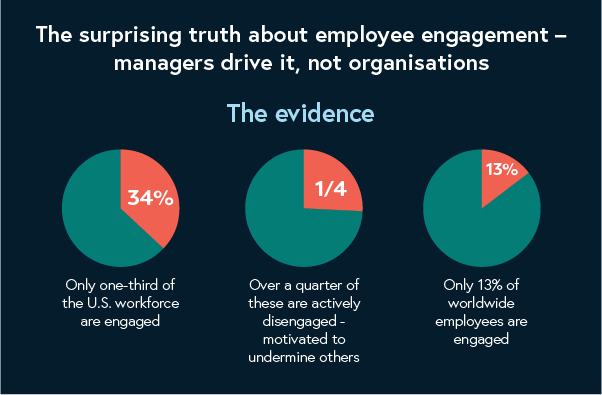How can business leaders and L&D teams better select, train and support managers? Managers have a surprisingly big impact on your business and there are many different ways to train and support managers - but first you need to understand what great managers do.
What do the world's greatest managers do?
First, Break All the Rules - what the World's Greatest Managers Do Differently (1999), is a modern management text written by Marcus Buckingham and Curt Coffman. The authors highlight current poor management techniques and how better managers create and sustain employee satisfaction. The book draws on 80,000 interviews with managers as conducted by the Gallup Organisation in the last 25 years. Facebook uses this book to train new managers.
This video explains the basic principles of talent management
Research shows that people will be most successful if they can work from their dominant talent
Managers are key to talent and performance
Because of the insights from this reading, my attitude to ‘management’ as a career path has changed. I dedicate this blog to all you managers out there who really want to improve your people management skills first, and then your company results! What I found most interesting is Facebook approach to management - they don’t recognise it as a promotion. Rather, Facebook considers it a specific type of career path that best suits the talents of an individual.
Learning and performance starts with recruitment, and then finishes with clarity and consistency. If you think about it, most of us recruit for a given role; we have a function in mind to grow our company and we think we know the skills and experiences that we need. We do our homework, we reach out to our networks and often we fill the role with very little insight to the person’s character, attitude and potential. Read more about how middle managers boost business transformation.
We all put our best foot forward at the interview stage – not only do we put our best suit on physically, we also do it psychologically. What happens down the line when the company hits some barriers or you have to address challenges? Does the highly experienced new recruit, which you recruited for their long service in the industry still cut the mustard? Research would say no.
Worldwide employee dissatisfaction - impact on talent and performance
Employee engagement polls, both for the USA and the UK puts most of us as ‘unhappy at work’. Of course, the turndown in the global economy has not helped, but there are other factors too. It said that people leave managers not companies, so if that is the case, then it makes sense that engagement should start with managers too.
Click the image below to see the full infographic with surprising evidence about employee engagement and managers.

What struck me about the book ‘First break all the rules’ was the hard line it took on relating company performance to its management. I liked how it stuck to the word manager, rather than the more fuzzy leadership term. It differentiates managers as people who look inward, and leaders who look outward; rarely do you get both talents in one individual. With great clarity, it says that the four keys to great management are:
The 12 questions employees ask, and need positive answers to are:
| 1 | Do I know what is expected of me at work? |
| 2 | Do I have the materials and equipment I need to do my work right? |
| 3 | At work, do I have the opportunity to do what I do best every day? |
| 4 | In the last seven days, have I received recognition or praise for doing good work? |
| 5 | Does my supervisor, or someone at work, seem to care about me as a person? |
| 6 | Is there someone at work who encourages my development? |
| 7 | At work, do my opinions seem to count? |
| 8 | Does the mission/purpose of my company make me feel my job is important? |
| 9 | Are my coworkers committed to doing quality work? |
| 10 | Do I have a best friend at work? |
| 11 | In the last six months, has someone at work talked to me about my progress? |
| 12 | This last year, have I had opportunities to learn and grow? |
So there you have – seems like common sense really. Treat people well, give them feedback, clarity on their roles, opportunities to develop, show you care and a good working environment = better company results!
There is more detail in the book about which performance, and which questions have the biggest impact on employee satisfaction. I urge you to read it or re-read it soon!
How can learning technologies help with talent and performance?
At the heart of all this is helping people to work well with others and helping people to learn and grow. Modern learning technologies can be instrumental in supporting your employees in this way, but only if you choose wisely. For example:
- If your organisation has a Learning Management System, how many people use it for something other than compliance courses?
- Does your company provide a social learning tool that encourages and makes daily communication and collaboration easier?
- Do your employees share content, ideas and insights for others to see regularly?
If you are interested in having a chat about how modern learning technology could benefit your company’s learning and talent strategy, get in touch. Or if you would like to know how you can be more successful in your role and make a bigger impact in your organisation - read our corporate guide to digital learning.










Was this article helpful?